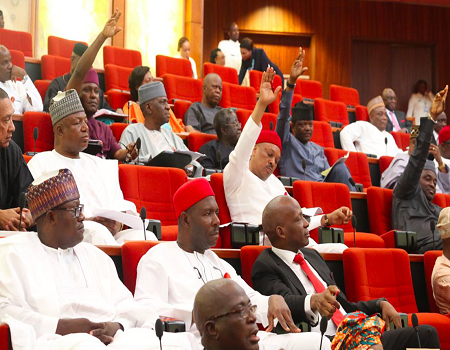Cashless policy: Senate asks CBN to review threshold for withdrawal limits
The Senate on Wednesday requested the Central Bank of Nigeria (CBN) to make upward adjustments to the proposed 100,000 naira per week for individuals and 500,000 naira per week for corporations in response to the public outcry.
The Upper House has also instructed its Banking, Insurance and Other Financial Institutions Committee to engage in aggressive oversight of the CBN on its commitment to flexibly adjust the withdrawal limit and to report periodically on results in the Senate.
The Red Room, however, has supported CBN in the continued implementation of transformational payments and financial sector initiatives.
The Senate's position follows the adoption of resolutions in its committee report after a heated debate by senators on the proposed policy.
The chairman of the committee, Senator Uba Sani (APC Kaduna Central), had in the report argued that the planned cash withdrawal limits were well designed by the CBN for the transformation of the national economy and that the action fell within the mandate of Apex Bank, as provided for in sections 2(d) and 47 of its current statute.
However, during the general debate on the report and the recommendations later adopted as resolutions, many senators objected to the timing of the policy, warning that it could lead to mass revolt in rural areas across the country because rural residents would be seriously affected by the policy.
In his remarks during the debate, Senator Ajibola Basiru (APC Osun Central), said that the proposed withdrawal threshold of 100,000 naira and 500,000 naira per week for individuals and corporations, respectively, was unrealistic.
“Laws are made for people not people made or created for law. If CBN acts under Sections 2(d) and 47 of its existing law to make life difficult for Nigerians through a policy, as representatives of the people, we must intervene.
“Such an intervention by us is intended to impress upon CBN that the proposed policy of cash withdrawal limits is unrealistic and highly prejudicial and detrimental to the well-being of rural residents, many of whom are our constituents.< /p>
ALSO READ FROM NIGERIAN TRIBUNE
“The report of this committee recommending the policy to us and by extension to Nigerians by suggesting flexibility in implementation is vague, nebulous and meaningless,” he said.
>Senator Adamu Aliero (PDP Kebbi Central), in his own contribution, said that the picture painted by the committee in its report on proposed CBN policy is nothing but an image ideal of what the economy should be, which is a far cry from what the economy actually is as far as Nigeria is concerned.
"The proposed CBN policy ignores the informal sector and is very detrimental to the livelihoods of rural dwellers who do not engage in online banking.
"The public outcry against the policy is too great, necessitating great caution regarding implementation as Nigeria's economy is predominantly rural," he said.
Senator Adamu Bulkachuwa (PDP Bauchi North), in his contribution, warned that the proposed policy, if not suspended, could spark revolt among rural residents.
He said the recommendations made by the Senate Banking Committee on Policy, which were later passed as resolutions, made no sense to him.
“The recommendations of the Senate committee on the proposed CBN policy are nothing but trying to put wool in the eyes of Nigerians,” he said.
Even Senator Orji Uzor Kalu (APC Abia North), who as a member of the Committee signed the adopted report on the proposed policy, objected to it in his contribution.
He said: N100,000 per week for individuals and N500,000 per week for corporations is too little.
“The N500,000 per day for individuals and N3 million per day for corporate entities implemented in Abia, Lagos, Ogun, Rivers, FCT, etc., should be maintained nationwide for the 'moment'.
Other senators who kicked against the implementation of the policy planned from January 9, 2023 were Biodun Olujimi (PDP Ekiti South), Chukwuka Utazi (PDP Enugu North), Stella Oduah (PDP Anambra North), Ibrahim Hassan Hadeija (APC Jigawa North East), etc.
Furthermore, Senator Stella Oduah (Anambra North) called the policy punitive and draconian which must be suspended for the sake of ordinary Nigerians.
But Senators Yusuf A Yusuf (APC Taraba Central), Degi Eremienyo (APC Bayelsa East) Francis Alimikhena (PDP Edo North), supported him in their separate contributions.

The Senate on Wednesday requested the Central Bank of Nigeria (CBN) to make upward adjustments to the proposed 100,000 naira per week for individuals and 500,000 naira per week for corporations in response to the public outcry.
The Upper House has also instructed its Banking, Insurance and Other Financial Institutions Committee to engage in aggressive oversight of the CBN on its commitment to flexibly adjust the withdrawal limit and to report periodically on results in the Senate.
The Red Room, however, has supported CBN in the continued implementation of transformational payments and financial sector initiatives.
The Senate's position follows the adoption of resolutions in its committee report after a heated debate by senators on the proposed policy.
The chairman of the committee, Senator Uba Sani (APC Kaduna Central), had in the report argued that the planned cash withdrawal limits were well designed by the CBN for the transformation of the national economy and that the action fell within the mandate of Apex Bank, as provided for in sections 2(d) and 47 of its current statute.
However, during the general debate on the report and the recommendations later adopted as resolutions, many senators objected to the timing of the policy, warning that it could lead to mass revolt in rural areas across the country because rural residents would be seriously affected by the policy.
In his remarks during the debate, Senator Ajibola Basiru (APC Osun Central), said that the proposed withdrawal threshold of 100,000 naira and 500,000 naira per week for individuals and corporations, respectively, was unrealistic.
“Laws are made for people not people made or created for law. If CBN acts under Sections 2(d) and 47 of its existing law to make life difficult for Nigerians through a policy, as representatives of the people, we must intervene.
“Such an intervention by us is intended to impress upon CBN that the proposed policy of cash withdrawal limits is unrealistic and highly prejudicial and detrimental to the well-being of rural residents, many of whom are our constituents.< /p>
ALSO READ FROM NIGERIAN TRIBUNE
“The report of this committee recommending the policy to us and by extension to Nigerians by suggesting flexibility in implementation is vague, nebulous and meaningless,” he said.
>Senator Adamu Aliero (PDP Kebbi Central), in his own contribution, said that the picture painted by the committee in its report on proposed CBN policy is nothing but an image ideal of what the economy should be, which is a far cry from what the economy actually is as far as Nigeria is concerned.
"The proposed CBN policy ignores the informal sector and is very detrimental to the livelihoods of rural dwellers who do not engage in online banking.
"The public outcry against the policy is too great, necessitating great caution regarding implementation as Nigeria's economy is predominantly rural," he said.
Senator Adamu Bulkachuwa (PDP Bauchi North), in his contribution, warned that the proposed policy, if not suspended, could spark revolt among rural residents.
He said the recommendations made by the Senate Banking Committee on Policy, which were later passed as resolutions, made no sense to him.
“The recommendations of the Senate committee on the proposed CBN policy are nothing but trying to put wool in the eyes of Nigerians,” he said.
Even Senator Orji Uzor Kalu (APC Abia North), who as a member of the Committee signed the adopted report on the proposed policy, objected to it in his contribution.
He said: N100,000 per week for individuals and N500,000 per week for corporations is too little.
“The N500,000 per day for individuals and N3 million per day for corporate entities implemented in Abia, Lagos, Ogun, Rivers, FCT, etc., should be maintained nationwide for the 'moment'.
Other senators who kicked against the implementation of the policy planned from January 9, 2023 were Biodun Olujimi (PDP Ekiti South), Chukwuka Utazi (PDP Enugu North), Stella Oduah (PDP Anambra North), Ibrahim Hassan Hadeija (APC Jigawa North East), etc.
Furthermore, Senator Stella Oduah (Anambra North) called the policy punitive and draconian which must be suspended for the sake of ordinary Nigerians.
But Senators Yusuf A Yusuf (APC Taraba Central), Degi Eremienyo (APC Bayelsa East) Francis Alimikhena (PDP Edo North), supported him in their separate contributions.
What's Your Reaction?






















